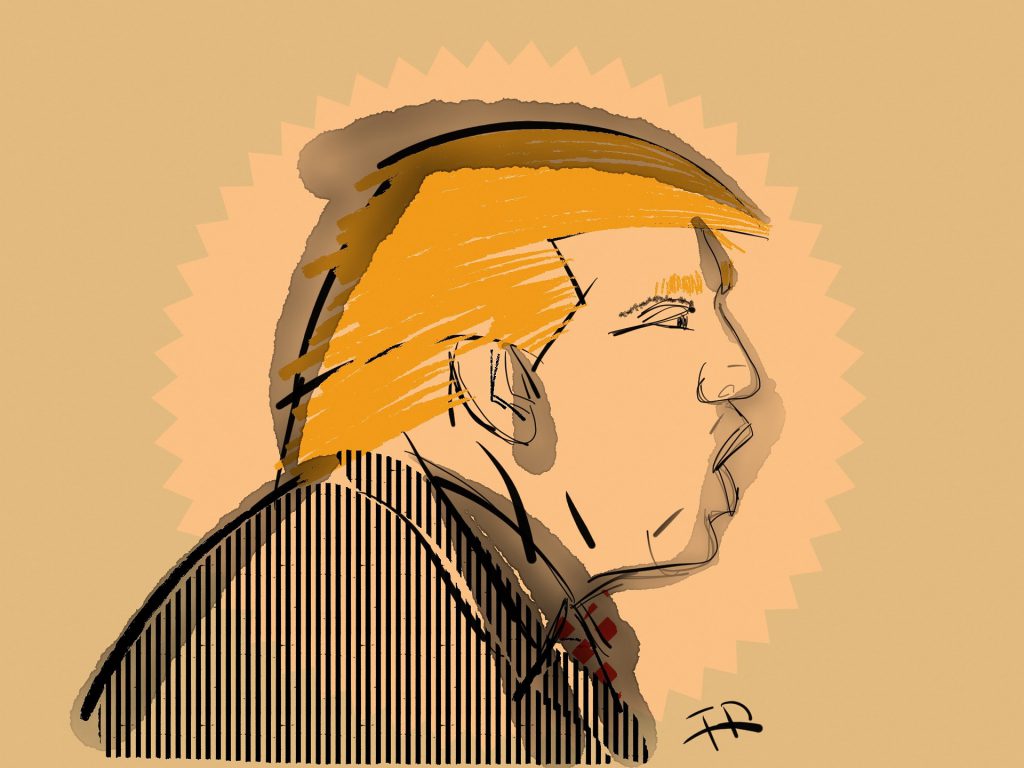India takes an unsentimental view on Trump—and Australia should too
Posted By David Brewster and Anthony Bergin on March 23, 2017 @ 06:00

Since last November, many of Washington’s closest allies and partners have been in a virtual state of panic over the impetuous and unpredictable President Trump. But on a recent trip to India we found that the view in New Delhi was rather different. Indian policymakers and analysts are a lot kinder to Trump than those in European or Asian capitals.
India’s been on the receiving end of US power more than once, not least through Washington’s long military support for Pakistan, which India sees as the world’s greatest source of terrorism. That’s led Delhi to take an unsentimental view of the United States as a power that’s hugely important, but also one that needs to be approached with a clear understanding of one’s own national interests.
India realises that it needs to work productively with the US in balancing against China. And India’s leadership is also keenly aware of how much the United States needs them as a balance against China—and it’s prepared to milk that fact for all it’s worth [1]. India and the US are pressing ahead with greater defence cooperation, which largely seems to involve [1] the United States making special deals to transfer defence technology to India.
New Delhi may dream of a multipolar Indo-Pacific, but there’s a clear understanding that there’ll be no substitute for US military power for a long time. But even as New Delhi understands the importance of a strong US presence in the region, Indians seem remarkably un-phased by Trump and what he may mean for the US–India relationship.
Like Trump, India’s Prime Minister Narendra Modi is a ‘strong man’ from outside India’s political traditions. Surely strong men will be better at doing deals with each other than with ‘ordinary’ politicians?
New Delhi isn’t unhappy with Trump’s overtures towards Russia: India’s had a time-tested relationship with Russia, which it considers an important partner and a strategic counterweight to China.
Nor is Trump’s apparently unconstrained support for Israel a cause of concern. Israel has sold India considerable amounts of military equipment. There’s been serious cooperation [2] between the military industries and the intelligence services of the two states. Modi is expected to visit Israel later this year [3].
Indians also feel less moral outrage than others at Trump’s tough border protection stance: Indian border guards long had a shoot-to-kill policy with immigrants trying to cross India’s border with Bangladesh and it’s in the process of building even more border walls [4] to ‘seal the border.’
Trump’s tough anti-Islamic terrorism stance goes down well in a country that has been on the receiving end of terrorism. President Trump has made it clear that a central focus of his tenure will be, in his own words, to ‘eradicate radical Islamic terrorism from the face of the earth.’ Although India is home to some 170 million Muslims, largely living in peace, it’s also a prime target of regular cross-border terrorist attacks from Pakistan.
Trump’s apparent tough-on-China stance (the South China Sea and trade) also plays well with many Indians who have come to regard China as India’s biggest long-term threat. Over the last few years, Indian strategists have become increasingly concerned that the US hasn’t been doing enough to stand up to China’s expanding military footprint in the Indian Ocean and Asia. They saw President Obama’s prevarication on Chinese island-building in the South China Sea as essentially giving China the green light for salami-slicing assertiveness elsewhere in the region, including on India’s disputed border with China.
Both countries are also concerned that China’s One Belt, One Road initiative and the China Pakistan Economic Corridor aren’t just about infrastructure [5], but are aimed at expanding China’s geo-strategic interests.
Of course, India’s equanimity towards Trump mightn’t last: any cut-off of US work visas to Indian IT specialists could, for example, do significant damage to India’s economy (and America’s as well). Ramping up US support for Pakistan, or doing a deal with China, could upset the equation. Nevertheless, India is probably well placed to continue to benefit from the US security relationship.
In Australia we tend to think that we understand our American partners well, after an alliance lasting more than 66 years. But maybe there are a few things we can learn from India’s approach. That includes not being too sentimental about the relationship and finding how one can best leverage your advantages.
Canberra will need to play its cards carefully over the next four years of the Trump administration to maximise Australia’s position. This includes diversifying our regional security relationships. More than ever, we’ll need to build up a regional network of strategic relationships [6], especially with partners such as India and Japan, as a partial hedge to the possibility of US retrenchment from the region.
We should also think about how to better leverage our relationship with the US and adopt a much more unsentimental approach towards the alliance. We need a much clearer understanding of where our and American interests begin and end and we’ll need to be less afraid of making explicit deals, just as India will be when it comes to pressing its interests with the US.
Compared to other countries, we’re probably well placed to benefit from Trump’s transactional approach to US allies. There’ll be a greater emphasis on making deals than on relying on warm and fuzzy shared values, and that may be a good thing.
As New Delhi well appreciates, change brings opportunities. Australia needs to move past our hand-wringing about Trump and think about those opportunities.
Article printed from The Strategist: https://www.aspistrategist.org.au
URL to article: https://www.aspistrategist.org.au/india-takes-unsentimental-view-trump-australia/
URLs in this post:
[1] for all it’s worth: http://www.lowyinterpreter.org/post/2015/05/28/US-India-relations-Whos-using-who.aspx
[2] serious cooperation: http://thediplomat.com/2016/11/an-india-israel-entente/
[3] visit Israel later this year: http://timesofindia.indiatimes.com/india/modi-may-visit-israel-in-mid-2017/articleshow/56926334.cms
[4] building even more border walls: http://economictimes.indiatimes.com/news/defence/india-bangladesh-border-to-be-completely-sealed-by-mid-2018-rajnath-singh/articleshow/56184234.cms
[5] aren’t just about infrastructure: http://www.lowyinterpreter.org/post/2016/08/22/India-plays-the-Balochistan-card-with-China.aspx
[6] build up a regional network of strategic relationships: http://ussc.edu.au/publications/Australia-India-and-the-United-States-The-Challenge-of-Forging-New-Alignments-in-the-Indo-Pacific
Click here to print.